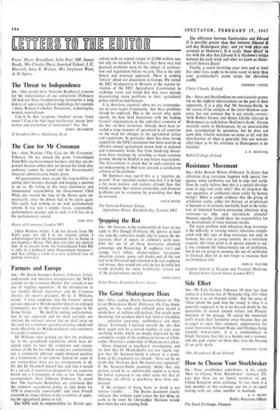The Case for Mr Crossman
SIR,—Alan Watkins (`The Case for Mr Crossman,' February 10) has missed the point. Consolidated Fund Bills are Government business and they are im- portant because unless they are passed the funds they authorise cannot be issued and the Government's financial administration breaks down.
All governments must accept the responsibility of getting their business through and keeping a quorum to do so. By failing in this most elementary and fundamental responsibility the Government Chief Whip also wasted the time of the House quite un- necessarily, since the debate had to be taken again. This really had nothing to do with parliamentary reform. It was just a simple, classic, catastrophic, parliamentary disaster, and as such, it will live on in the parliamentary record.
[Alan Watkins writes: I do not dissent from Mr Peel's view; nor did I in my original article. I acknowledged that the Government was to blame in not keeping a House. This does not alter my opinion that, in its present form, the Consolidated Fund Bill is only in a technical sense Government business— and that calling a count is a very technical way of gaining victories.]





























 Previous page
Previous page